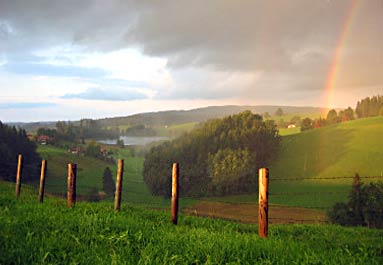This original column is provided free for one-time use with author credit at the end. It may be used for background with author credit. Copyright applies.
#58 FOR IMMEDIATE RELEASE: October 16, 2008
Panic reigned: What to do about the hay?
By Curtis Seltzer
BLUE GRASS, Va.—This thing that’s paralyzing our big banks and gutting the stock market used to be called a “panic.” Today, it’s a meltdown, or a mess or an “unscheduled event.”
Panic is the best description. I’ve been in a few. Fear pounds your flight button. Everyone starts moving away from the threat. Faster. Then wildly, desperately faster. Someone goes down; then others. Screams.
In battle, it’s called a rout. In cattle, it’s a stampede.
Fear starts it, fear feeds it. The fear is rational: Stay where you are, and you’ll get hurt. But fear smothers the part of your brain that might save you, the part where you keep your wits.
One person at a time, panic stops. Fear is not mastered, but it is compartmentalized. Reasoning returns. It suggests that a better alternative might be to turn and face the threat, accepting the possibility of bad consequences. Those who turn into the threat bring others with them. The pell-mell slows and eventually stops.
In the stock markets, this is called the “point of capitulation.” Cattle stop trying to escape. Investors sell because getting out with a big loss looks better than staying in for a bigger one.
We are closer to a bottom in stocks than in real estate, because stocks have fallen farther and faster.
Country-property values have not dropped as much as their metropolitan cousins despite being over-valued. Sales have slowed, and some prices have been lowered. But I’ve not seen 50 percent reductions anywhere.
The factors that goosed urban and suburban house values until 2007 -- speculation, too easy money, among others -- were much less present out here. Some country parcels should come down by as much as 50 percent, but most are overpriced in the 15- to 30-percent range.
Amid the retches and wretches of western financial civilization last week, my wife, Melissa, made a deal.
She needed 100 bales of horse-quality hay for Spirit and Red, her Tennessee Walkers.
I encouraged her to buy it from a neighbor who has been a solid friend for 25 years. His hay is a mix of native grasses from fields we know, made properly into regular-sized square bales. No mold, no weeds, no problems. Fair price. Close by. We had bought from him before. What’s to decide?
Alas. Simple solutions, I’m forced to admit, are the hobgoblins of minds like mine.
Melissa chose, instead, hay from Mr. Alternative.
She called me last Friday morning and asked if I thought I could ready the barn for delivery. Restacking hay bales and sweeping barn floors usually fall within my realm of demonstrated competencies. I haven’t broken a broom in a long time.
Mr. Alternative arrived with 50 bales on his truck and began unloading. I helped.
Farmers are both knowledgeable and fussy about hay, particularly purchased hay.
I am even more particular about purchased hay for spousal horses who rank far above me in the hierarchy of my wife’s affections.
As I unloaded the first five bales, I noticed they were short. Bales, typically, are 36 to 40” long; these were 30 to 32. They didn’t weigh what I thought they should, but maybe, I thought, I was just being suspicious or cranky. They looked like they had been barned-up for a year or more, but I could have been wrong about that too. They didn’t smell like this year’s cutting, but I am commonly acknowledged to have a nose that couldn’t smell a skunk sitting on my lap in a linen closet.
Still, these bales seemed off. “Did you tell Melissa you were selling short bales?” “No.”
She had asked for horse-quality hay. Mr. Alternative knows what horse hay is and isn’t. This wasn’t.
For $3.50 a bale, she thought she would get what Mr. Alternative knew she was expecting. She had negotiated price and delivery, but not specs.
Melissa had made an assumption.
We’ve done this before. Many years ago I ordered 200 sharpened locust fence stakes. They arrived on the appointed day—all 200 and each sharpened to the point of fine human hair.
They were so thin that I used several for toothpicks and flossed with others.
They were also a foot shorter than the local standard, eight feet.
I, too, had made an assumption. I did not say eight-feet long and stout. So I paid the fence-splitter and suggested that he use me for a business reference.
We unloaded the 50 bales, making me angrier with each one. Had this been my deal, I would have stopped unloading after ten bales, paid and thanked Mr. Alternative for thinking of me. But Melissa is a turn-her-other-cheek kind of girl, though in my opinion she’s running low on cheeks.
I phoned and gently suggested that she cancel the second 50 from Mr. Alternative. She agreed, and paid him for the crummy 50.
That night, Red and Spirit left most of their “new” hay uneaten. I’ve seen these two eat barns, paint off pickup trucks, wire fence and my forearms. Still, they are not without their palatability standards, which apparently excludes broom sedge.
I went up into our woods the next afternoon to putter and mutter. It was warm and sunny. The hardwoods -- black birch, red oak, sugar maple -- were afire. Their reds, yellows and golds played like a 1940s Big Band, and I was sitting in the front row being blasted.
Suddenly, the late sun hit a big sugar just right, exploding its colors, making it glow from the inside out. It was better than the best note Benny Goodman ever blew—higher, purer, sweeter, more impossible.
“It’s an honor,” I said.
Wall Street is Wall Street. Mr. Alternative is who he is.
Other things are important, too.
Curtis Seltzer, land consultant, is the author of How To Be A DIRT-SMART Buyer of Country Property at www.curtis-seltzer.com. He holds a Class A residential contractor’s license in Virginia and has lived in a now 90-year-old farmhouse for 25 years.
Contact: Curtis Seltzer, Ph.D.
Land Consultant
1467 Wimer Mountain Road
Blue Grass, VA 24413-2307
540-474-3297
curtisseltzer@htcnet.org
www.curtis-seltzer.com
This original column is provided free for one-time use with author credit at the end. It may be used for background with author credit. Copyright applies.
.
|









